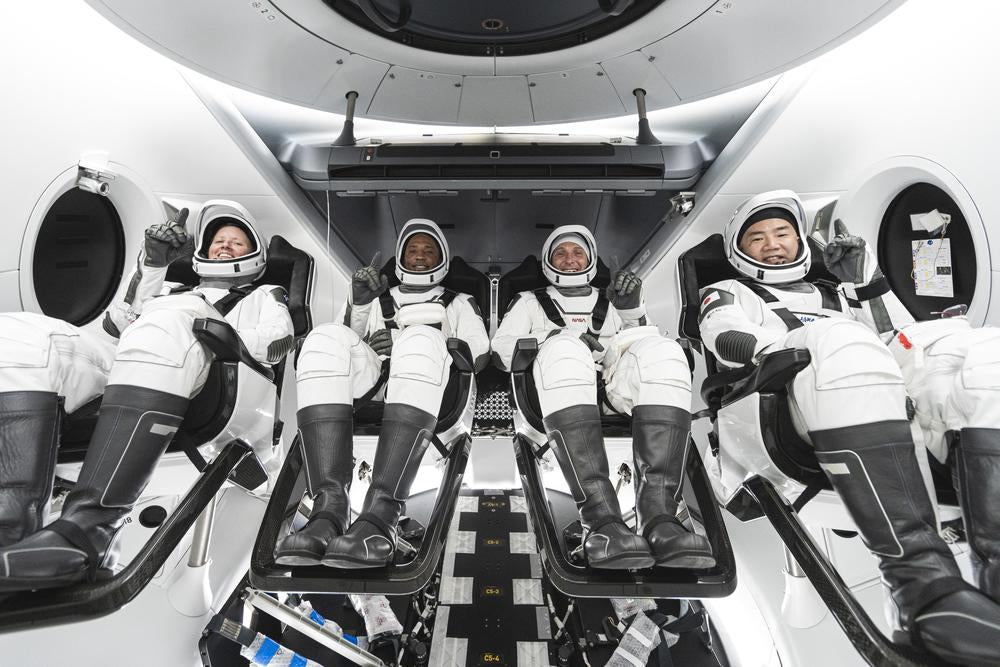Featured Image Source: NASA
SpaceX is working to fix a Falcon 9 engine issue that delayed missions for the United States government. SpaceX was scheduled to deploy an upgraded Global Positioning Satellite (GPS-III Space Vehicle 04) for the U.S. Space Force atop a Falcon 9 rocket on October 2nd. SpaceX attempted to deploy the GPS-III satellite but at around two seconds before the 9:43 p.m. EDT liftoff timeframe, launch controllers scrubbed the launch at Cape Canaveral Air Force Station's Launch Complex 40. The founder of SpaceX Chief Engineer Elon Musk said the mission was aborted due to an "unexpected pressure rise in the turbomachinery gas generator" of the Falcon 9 launch vehicle's first-stage.
The issue caused NASA to delay the next astronaut launch. The Crew-1 mission will be SpaceX's second crewed flight to the International Space Station (ISS). SpaceX is set to launch NASA astronauts Michael Hopkins, Shannon Walker and Victor Glover and Japanese Aerospace Exploration Agency (JAXA) astronaut Soichi Noguchi, aboard the Crew Dragon spacecraft that will launch atop a Falcon 9 rocket.

Source: NASA
NASA’s Human Exploration and Operations Mission Directorate Kathy Lueders announced the agency now targets a date no earlier than (NET) November. "We’re now targeting NET early-to-mid November for launch of NASA’s SpaceX Crew-1 mission to the Space Station. The extra time will allow SpaceX to resolve an unexpected observation during a recent non-NASA launch attempt," Lueders stated on October 10. Since then, SpaceX has been performing hardware testing of its Falcon 9 launch vehicles.
This week, Lueders provided an update --"We are making a lot of good progress with SpaceX on engine testing to better understand the unexpected behavior observed during a recent non-NASA launch," she stated on October 21. "It’s too early to report findings at this point, as SpaceX continues testing to validate what’s believed to be the most credible cause."
We are making a lot of good progress with @SpaceX on engine testing to better understand the unexpected behavior observed during a recent non-NASA launch. (1/5) pic.twitter.com/vhtj8UQVxb
— Kathy Lueders (@KathyLueders) October 21, 2020
Lueders also shared that SpaceX opted to replace one out of nine Merlin 1D engines of two Falcon 9 rockets that are scheduled to fly a pair of NASA missions next month. --"Based on our current analysis, SpaceX is replacing one Merlin engine on the Sentinel-6 Michael Freilich launch vehicle and one engine for Crew-1 rocket that displayed similar early-start behavior during testing," she said. An engine will be replaced on the Falcon 9 that will launch the second astronaut crew from American soil. And an engine will also be replaced on the Falcon 9 rocket that is scheduled to deploy NASA's Sentinel-6 satellite. It is a golden 'house-shaped' satellite equipped to observe Earth's oceans and gather valuable data on climate change, pictured below.

Source: NASA
"We are still targeting the Sentinel-6 launch for November 10 from Vandenberg Air Force Base as we expect to complete forward work in time," Lueders stated via Twitter. "We are also still working towards a mid-November launch for Crew-1. We will want a few days between Sentinel-6 and Crew-1 to complete data reviews and check performance. Most importantly, we will fly all our missions when we are ready," she added.
We are also still working towards a mid-November launch for Crew-1. We will want a few days between Sentinel-6 and Crew-1 to complete data reviews and check performance. Most importantly, we will fly all our missions when we are ready. (5/5) #LaunchAmerica
— Kathy Lueders (@KathyLueders) October 21, 2020







